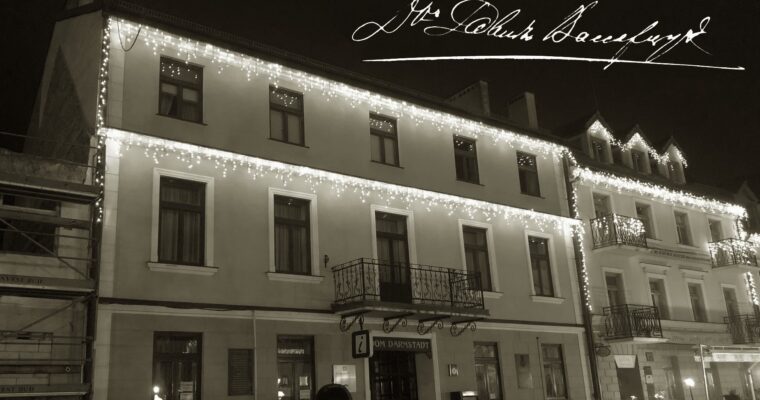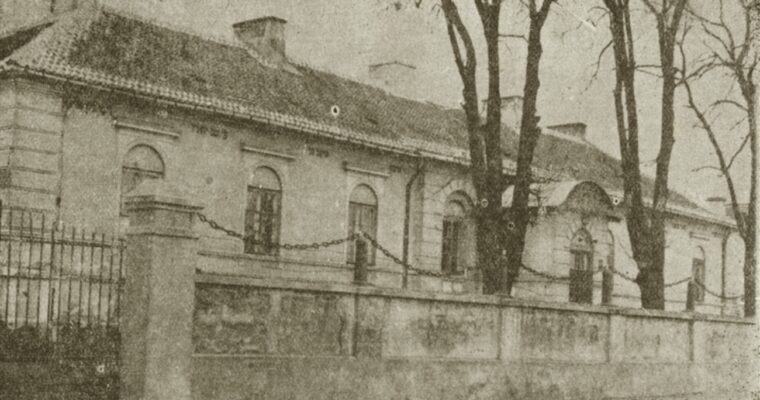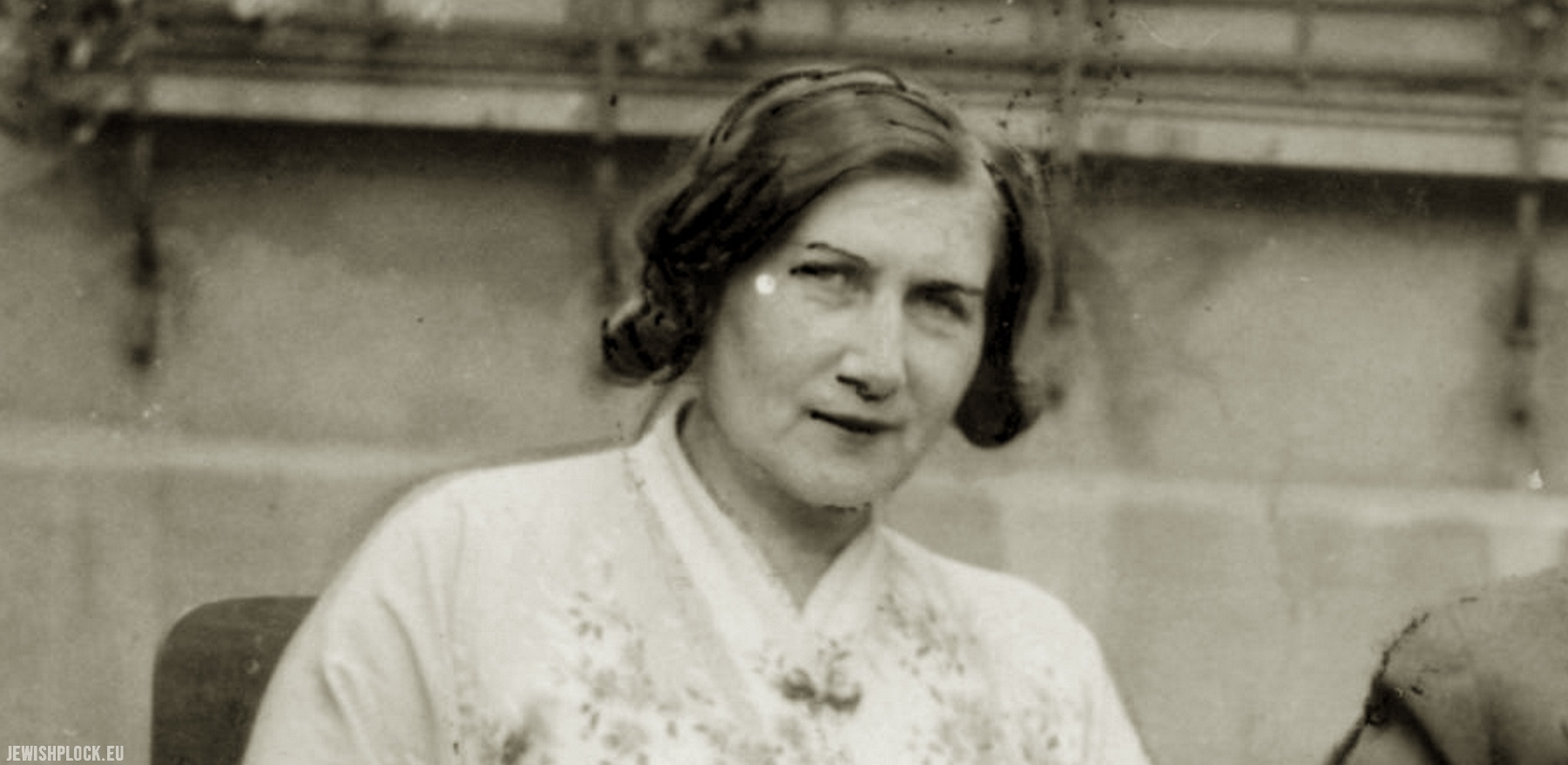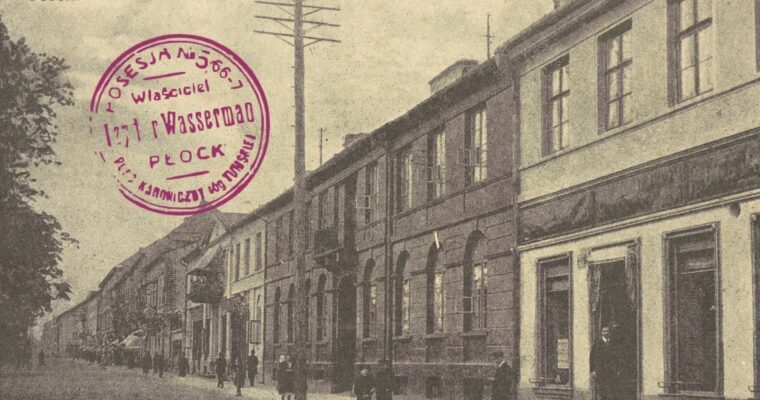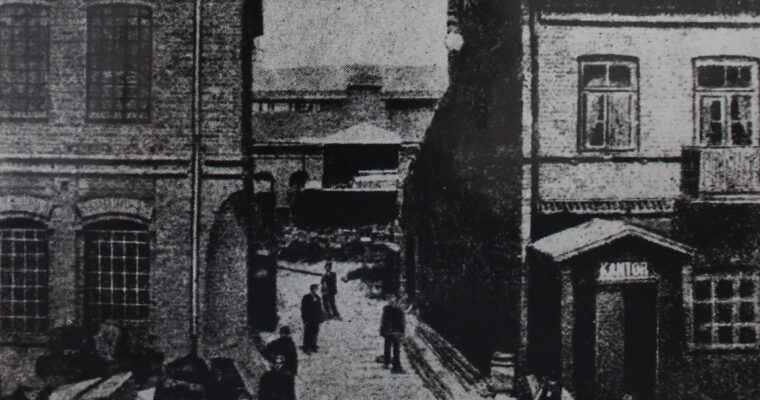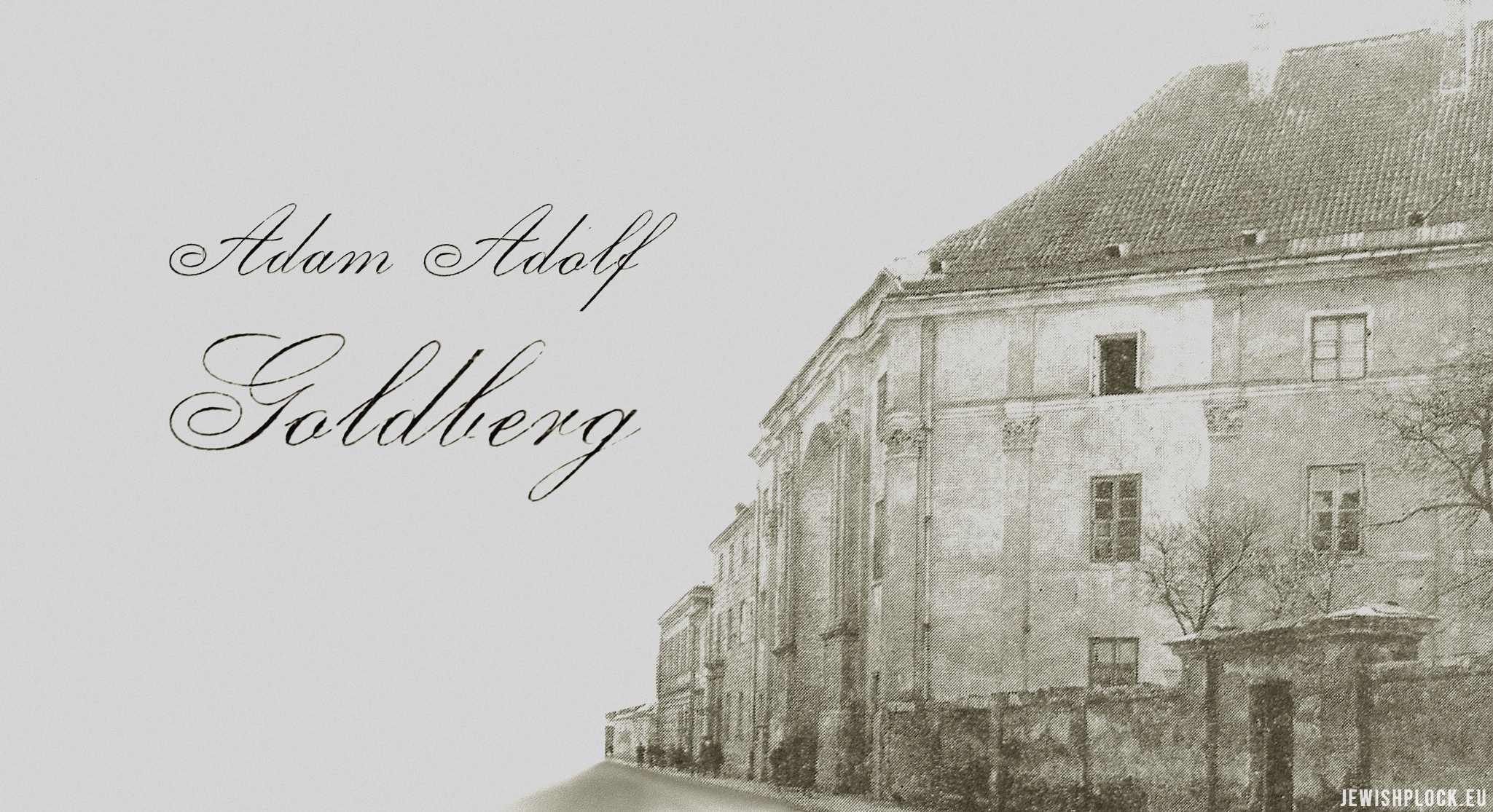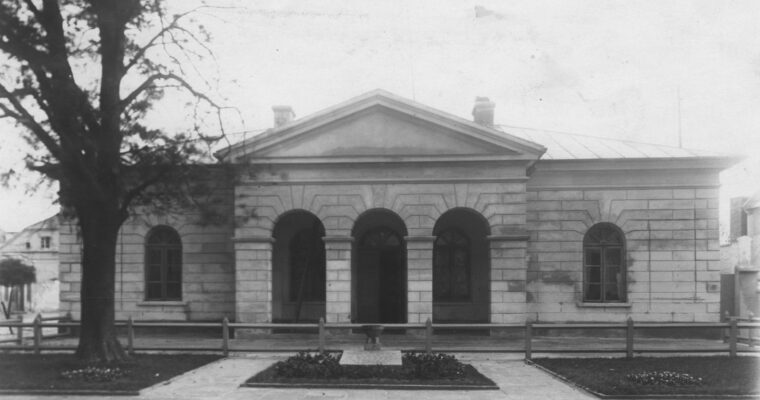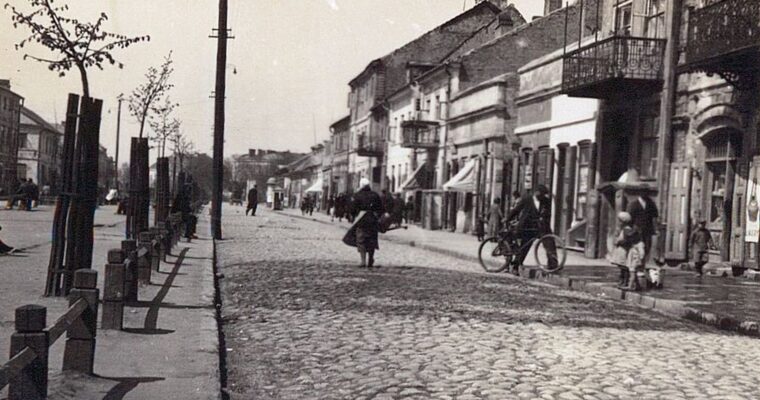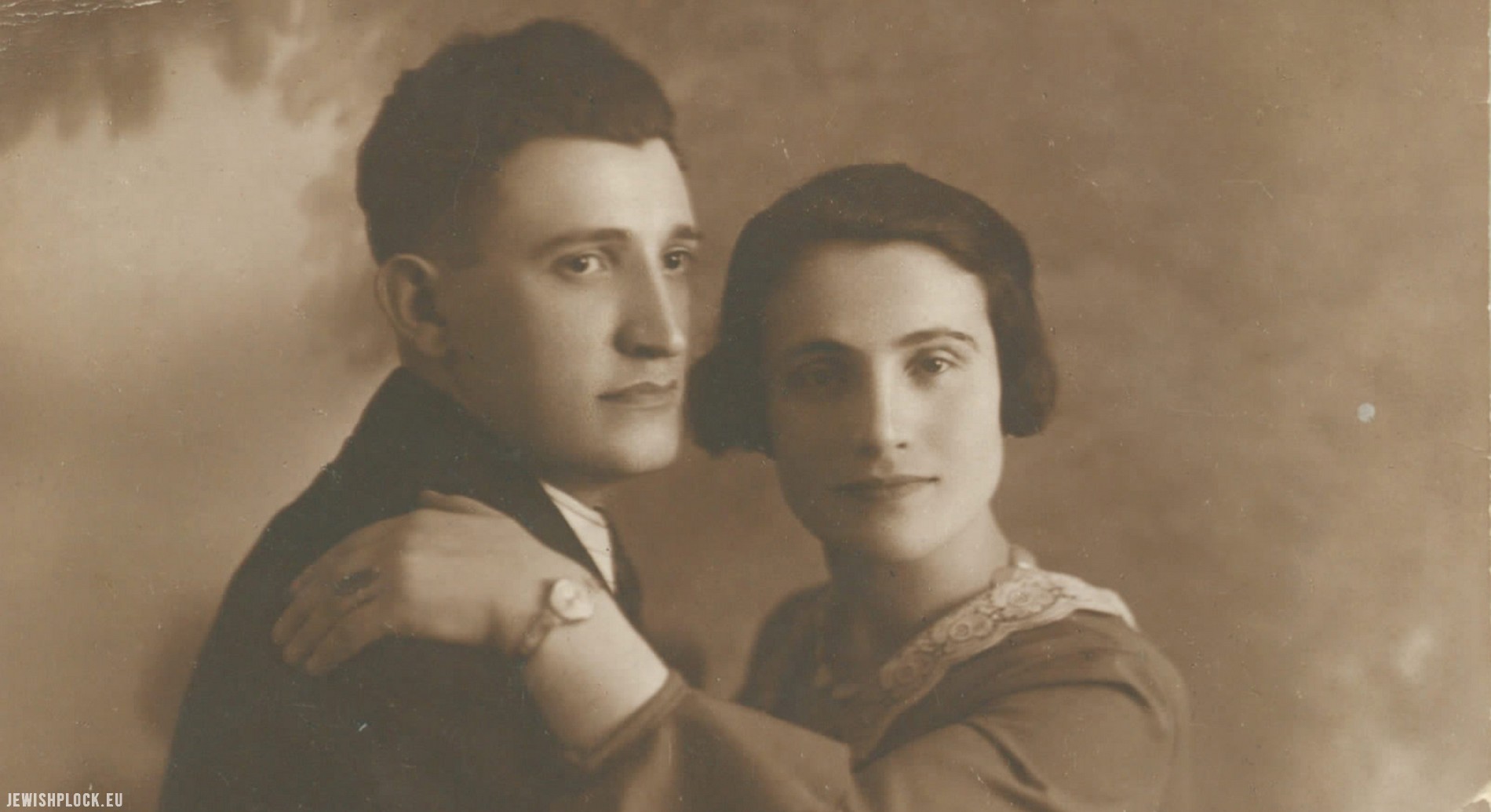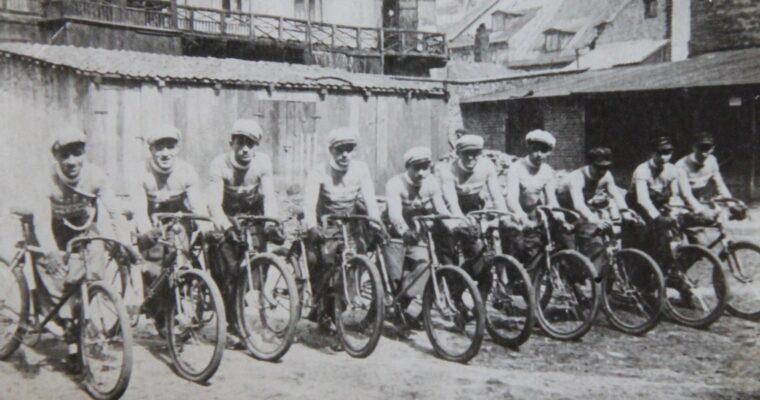In the collection of the Archives of Modern Records, in the archival set Collection of personal files of workers’ activists under the reference number 16266, there is documentation on Adolf Adam Goldberg (1865-1933) from Płock. This political activist, coming from an assimilated Jewish merchant family, and brother of the well-known poet and art critic Mieczysław Goldberg, left a very personal diary entitled “From the field of thoughts, feelings and will”, written in the years 1884-1886. The diary of Adolf Adam Goldberg is an important source of learning about the private life of a Jewish family in Płock, as well as the history of education, the town and its inhabitants. The Nobiscum Foundation plans to publish this very interesting diary in the future. Today, we would like to present its author.
The roots of the Goldberg family reach back to the village of Przewodów, located 24 kilometers away from Sokal. In 1810, Adolf Adam Goldberg’s grandfather, Józef, was born in Przewodów. His parents were Lewek and Fajga. In search of a better life, Józef Goldberg moved to Płock, located more than 400 kilometers from Przewodów. Here he established a tavern, which operated at Jerozolimska Street. Józef Goldberg lived in the house of Icek Karasek, the owner of an iron and farm tools store, on the corner of Szeroka and Jerozolimska Streets. Today, this house is known as the Rabbi’s House.
Józef Goldberg married ten years younger Brucha, the daughter of Szmol and Hina Bachliński, who came from the town of Kowal. Józef and Brucha had three sons – Rachmil (born in 1849), Szlama Lejb (born in 1842) and Dawid Abraham (born in 1858) and a daughter, Fajgla (born in 1852).
Szlama Lejb Goldberg was involved in the trade of spices, cotton and linen materials, glass and mirrors, earthenware, leather, footwear, stationery, grain, wood, men’s ready-made underwear and furs, for which he received a permit on July 8, 1861. In 1862, he developed his commercial activity by establishing a furniture store. His wife was Enta Julia née Dancygier from Warsaw (born 1837), daughter of Jutka and Doba. The Goldberg family lived at Grodzka Street, initially at number 11, then at number 5. These places were associated with the childhood and early youth of Adolf Adam Goldberg. Adolf Adam had several siblings: brothers Awrił Moszek vel Mieczysław (born 1868), Jakub Fiszel (born 1870) and Wolf vel Władysław (born 1876) and sisters Frajda (born 1871), Chawa (born 1873), Estera Dwojra (born 1875), Chana Krajndel (born 1876) and Chaja (born 1878).
Adolf Adam Goldberg attended the government gymnasium (junior high school) in Płock, where he belonged to a secret self-education club and a group of “moral improvement”. He had some health issues, from an early age he suffered from neurasthenia, which caused several longer breaks in learning. He graduated from high school in 1887. He then tried to go to medical studies in Warsaw, where his family had moved, but was refused admission. He went to study medicine in Vienna, where he came into contact with the workers’ movement. After a year he returned to Warsaw and this time he was admitted to the university. He was an active member of the Polish Workers’ Union. Faced with impending arrest at the turn of 1891 and 1892, he went abroad, initially to Paris, then to Prague, where he studied gardening. From Prague he went to Vienna, where he was expelled for participating in the socialist movement. He came back to Warsaw, but due to health problems and the lack of a job, he soon moved to the Baranówka estate, where he worked as a home teacher and was also involved in gardening. He spent almost the entire year 1895 in Warsaw, in the years 1896-1897 he stayed in the settlement of Firlej in the Lublin region. In March 1898 he went to Krakow, then to Paris. In 1900 he stayed in Belgium, then again in Paris, and finally in Italy. He published in the Warsaw-based “Głos”, and in 1902-1905 he wrote for “Ogniwo”. In 1903 he came to Warsaw. During the revolution of 1905, he took an active part in establishing trade unions, he edited the magazine titled “Metalowiec”. After the split in the Polish Socialist party (PPS), he belonged to the PPS-Lewica fraction. In the final phase of the revolution, he was arrested. On March 14, 1907, he was released from the Pawiak prison. In the summer of 1907 he was in Switzerland, the following year in Krakow, where he was active in the local PPS-Lewica section. He then left for Italy. The First World War found him here too. He was then an active participant in the October Revolution. At the end of 1920, he moved to the south of France due to his deteriorating health. In the years 1924-1928 he worked in the Russian diplomacy, initially as a consul in Trieste, then as a general consul in Rome. He died on May 19, 1933.
“From the field of thoughts, feelings and will” – excerpts
July 22, 1885
I belonged to a bunch of wonderful children, my mother especially caressed her firstborn son, pampering him in everything and making him somewhat fat, which again did not prevent her from being too strict and often making me feel bad in later years. I remember well how my father used to point that my peers had more knowledge. These suggestions hurt me a lot, and I always wished that a moment would come as soon as possible when my father had no right to make any more complaints. My freedom was the most restricted when it came to my choice of companions and games we played. At a very young age, I understood that in order not to incur my father’s anger, I had to be friends with the sons of bankers, senior officials, and at least with the sons of middle-class merchants. My father had a clear grudge against me for my other acquaintances. In more recent times, he did not even understand how I could not be friends with the sons of CEOs, eh… As for games, in my early days I had a passion for organizing lotteries, and then for football, my father did not like any of these activities and it was necessary to play them without my father’s knowledge, so that every inappropriate decision I made afterwards would not be blamed on playing football too much.
I have always liked the company of girls, I was extremely sensual from an early age, which was especially influenced by the maids, whom I was constantly accompanied by. Thinking that all sensuality must be alien to a small child, they talked to me about various sensual things, undressed and showed their naked bodies, not even suspecting how much I found it interesting. As far as I can remember, I often played with the girls from the yard, especially with those who, taking advantage of ignorance of their parents, used to behave more freely when playing games. In some empty corner of the yard, or in the coach house, they stripped almost naked and played in baths, theater; sometimes these games became very indecent. If only I could sneak out of the house, I rushed to those places. I was maybe eight years old, the girls were 10, 12 or more. Under such conditions, my sensuality began to develop very early. Unknowingly, I looked greedily at those girls, sometimes half-naked, and sometimes completely nude, and I tried to be close to them as long as possible.
I do not remember much about my life, both after entering gymnasium and during my stay in the first four grades. In the next grade, I was in love with Rozalia Schönwitz, my friend’s sister. I still had to find excuses to visit her as often as possible, kiss her hands, hear her voice; I often asked her to explain something just to hear her speak. This unconscious love lasted some time; I remember that the news of her marriage made me very sad. Until the fourth grade, as it seems to me, everything was going as normal: I was a mediocre and sometimes even worse student, I felt respect for the best students and that was it. I had an exam in fourth grade. It was actually the first time I had to take an examination. I was preparing for almost half a year and I solemnly attended it like a Catholic attends communion. The exams went well, I stayed awake at night, studied, was cheerful and looked forward to the end, expecting so much happiness afterwards that I couldn’t even embrace. The exams were over, I was promoted, but with no additional reward, I was satisfied for a few hours, and how surprised I was when I could not answer the question of where was all the happiness after graduating, which I expected so much. I wanted to be in fifth grade and do my exams well; I have fulfilled those intentions; I didn’t need to sit down at night, study all the time, I had the right to give private lessons, but I was not satisfied. I wanted something, I wanted something badly, but I didn’t know what it was, I felt sorry for those moments during the exam, I missed them, and in my silent despair, not knowing how to help myself, I slept day and night. It turned out for me that the most pleasant thing to do is to strive for a goal, then you have a lot of hopes, views and plans, and only when you reach your goal you see the idleness of our efforts and that dissipates all illusions.
Starting from the fifth grade, national identity feelings started to wake up in me, because so far the tutor tried to instill in me “state identity” feelings, which lasted three years. There was a revival of some sort, I subscribed to Polish magazines, I read whatever I could, poetry, novels, I was very excited about them, but I couldn’t share it with anyone, talk about my feelings, I only shared my impressions with my brother, but that was not enough for me. I regretted that I had stopped learning Polish and I absolutely wanted to learn again. For a year and a half, I read and got excited about everything Polish, over history, poetry, etc. Meanwhile, among my fellow Christians, I found more and more companions with whom I talked about things about which we all didn’t know anything. I tried to gain recognition from my fellow Christians, I often got excited and argued, my enthusiasm often drew me into lies, I said that I had read what I hadn’t even heard about, because I assumed it was a shame for a Pole not to read it. Hearing an unknown name or something already troubled me, I thought it was some celebrity about whom it is a sacred duty to know. I considered everything that was Polish to be holy, I was angry once I read the article of “Prawda” reproaching something to society. I saw great patriots, experts in language and native literature in all my Catholic colleagues. It was only in the sixth grade, when I started going to Polish lessons again, then I got to know my colleagues a little better, and really well at the end of the year, when I established a closer relationship with them. At the same time, I was unknowingly a follower of Rousseau. Our civilization seemed to me to be a distortion of the natural, full of happiness and virtues human condition from the primitive times. The same mental urges I shared with Rousseau, selfishness and compassion led me to this conclusion. Selfishness, on the one hand, demanded the greatest satisfaction of ambition, and on the other hand, it whispered to me that, with my abilities and inclinations, I cannot even come to be a decent, ordinary individual. These reasons drove me to avoid the company of ladies (I was afraid that they might appeal to me, and I might be pushed away shamefully). I was looking for more and more mistakes in our social life and social relations, and thus I became an enemy of civilization as such. Civilization – in my opinion – was based only on dull bourgeois life, merchant fraud, etc. The antithesis was the primitive state, life in nature. For this reason, the most dear to me were those social groups which took the least part in our civilized life, namely the peasants and workers. I attributed the highest virtues, the most tender feelings to them. I was still reading idylls, I found them exciting, I even started to write a monograph about idylls. But soon it was all over.
The following year was when all the upper grades spent more time together. The 8th grade students wanted to be popular, and we wanted to be appreciated and therefore had a very busy life. We read and talked about everything. Philosophy, poetry, history, brochures of all kinds – these were our usual source of mental nourishment. We often came together, we formed various associations, it was all very exciting, we were always full of fantasies and enthusiasm, everyone was inspired by our surroundings. This incontinence affected our relations with teachers, and at that time we were the most independent of them.
Although in less than a few months we saw many disadvantages of this life, e.g. reading brochures and reviews preoccupied the head with ready-made doctrines, which most often only served antitheses and were in fact more harmful than beneficial, secondly, in all this feverish reading and thinking there was no systematicity, however this life moved us, pushed us to act, and as soon as these influences stop, we stop as well, pondering and meditating, we switch from pessimism to apathy. Still, these are the most pleasant moments of my youth. How many more doubts and disappointments will I have to go through, how many times will I detest my life and be stuck in apathy to everything, in order to resume my activities for some time, fall into the rut of life after many painstaking hours just to fail again. How many more varieties of such things do you have to go through until your blood clots, and your life is over!
December 2, 1885
My blood is boiling. I’ve been distracted and upset for a few hours now, and I can’t calm down. My cheeks are burning and then turning pale, my temples are twitching, and my head feels as if someone was hitting it with a hammer. One thought is still haunting me like a nightmare: you are mean, so mean and so on. The only side of my character so far unaltered, my “sense of personal dignity”, has been shaken. I answered questions in geography, the lesson was about Poland. When I was talking about the country’s population, I said there are Poles, Germans and Jews, like it was written in the book. The teacher forced me to repeat this section of the lesson (for what purpose?). When I was approaching this unfortunate fragment, all the blood rushed to my head, I must have been red or purple, my head, my mouth was burning, and after a long hesitation I said it according to the book. As if falling into the abyss, with my eyes closed, I uttered, almost unconsciously, what had caused me so many troubles, not as my dignity dictated, but as my interest demanded. The teacher seemed pleased, and I don’t even know what was happening around me at the moment. Colleagues, who find such things very natural, probably do not think of any accusations against me, and even if I had used a different maneuver, they would not understand. But it is all the worse, because different behavior under different conditions would be calculated as an attempt of pretending to be some kind of martyr. Others find their behavior very rational when committing evil things. Oh, cruel nature! It created me as a villain, while at the same time giving me the opportunity to feel my villainy! Well, what will happen later, what shape will my moral spine will be, when I take a certain position. Perhaps the moment of assuming this position will be delayed to infinity. What will happen to me when I despise myself, and on whom more than me should depend the independence of my own spirit and self-recognition. I am strangely placed in relation to science and life, I feel the inability to distinguish myself in any field, and my ambition does not allow me to live in mediocrity. In dreams of the future, I always see myself somewhere in the back, but always independent and proud. Well, if this only treasure of mine is lost, I will fall so low that I will never be able to rise again, when I despise myself. My patriotism, independence, and personal dignity have never been put to the test. When these principles of mine appear in my relations with people, I safely manifest them, because I can count on the applause of the supporters, or on the slander of my opponents, which in the eyes of the party that cares about me turn into praise and a martyr’s wreath. This, of course, only satisfies my ambition. Never before have my principles come into contact with interest. It was the first situation, and how unfortunate I came out of it. From this point of view, I see the described event, because the fact itself is not significant for others, and my actions could be justified for many reasons, including that: I) a different classification of the population could cause a dispute, a patriotic argument, which I do not want in that house of ”thoughtlessness”, and: II) the consequences of raising the issue so sensitive, could take its toll on me and many colleagues and draw the attention of the authorities to us, and it’s better to let sleeping dogs lie… But since I see this event from a different point of view, I am simply loosing my mind. I think, I start reading, not knowing what I am reading, I throw the book aside and jump up, I don’t know what I’m doing, my head is getting messed up. I feel some self-loathing, it seems to me that I am splashed with mud. I hurt myself, passing around the governor’s house, avoiding the senior officials, I say to myself inside: crawl in front of them, kiss their knees, they know how to value such zeal…
It seems to me that I have lost all my personal dignity, my independence of spirit, and I miss them as if I were losing a dear child. At the moment, I am thinking about myself not so much with contempt as with pity, deaf sighs are coming from my chest at the thought of losing my precious treasures, I see myself as a morally lost being. I’m pausing because my head is spinning, I don’t know what I’m writing … This circumstance shocked my whole being. I only have a few such memorable moments in my life, which if they were to be repeated more often and with equal force, I would probably perish.
December 17, 1885
The curator visited us. The teachers’ faces showed fear and humility. Every creak of the door troubled them, they were unable to collect their thoughts to listen to the lessons. They were all pale and frightened, their noble thoughts and feelings died within them. This is what such a relationship can do, it can degrade human souls. They themselves feel it, with a few exceptions, and probably after returning to their beloved people, thoughts and feelings, they throw off their clerical robes with disgust.
I now understand well that only freedom and independence can contribute to the development of the human spirit in all sorts of ways, and on the contrary, dependence and discipline in bureaucratic states can create power, but they are barren and shallow ground for something more sublime. A well-complicated hierarchy of officials is so constituted that everyone oppresses those situated lower and is oppressed by those in higher positions. Human thought exhausts itself in finding ways to please the superior. Each of the latter’s movements, the sound of the voice, must be explained to oneself and their intentions should be anticipated, this is the main duty of an official. The clerk is frightened at the sight of his superior like a slave. I saw another similar example when the governor visited he Zakroczym municipalities. By the time the ship had not yet landed, they were already saluting, and the governor’s approach was causing visible shivers down their bodies. They were so confused, when he came close to them, that they were unable to reach out and exchange a few words for a greeting.
Any form of government always requires this bureaucratic hierarchy, which is the same always and everywhere, and therefore I hate any form of government, and I prefer unlimited freedom, but some ideal freedom, not encompassed by time and space, because everything that is implanted on real ground and introduced in practice, eventually ferments and deteriorates. It’s an old truth, that every idea, all realized thought debunks its past.
January 31, 1886
School provides many insights about human nature, the mutual relations among a certain group, as well as the mutual relations of the two groups: the rulers and the ruled. Respecting power, of any kind, armed force, money, or mental abilities, which is the undisputed faith of all ages and generations, takes on a very clear form among students even in junior high school. The best students, whose only advantage is a relatively greater knowledge of Latin and Greek, are most respected, most favorably spoken of and everyone strives to establish closer relations with them, both because of the intention to copy the exercises from them, which will be discussed below, and because of their desire for power.
In dealing with each other and with teachers, they do not find any means inappropriate when it comes to satisfying their needs, sometimes they become extraordinarily disgusting. As I mentioned above, they make closer acquaintances with the best students, they fool around, just to be able to copy their exercises, but that’s not the end, as there are those who care about popularity, want to feel welcomed by everyone, they make clowns of themselves, entertain the class; meanness is most evident in relations with teachers, when they try to please them by calling Russian things “ours”, etc.
These are ample testimonies of selfishness as the greatest leverage of action. In order to ensure the greatest possible benefit, they commit acts inconsistent with our European morality, and this group, for its interests, does not see the need to adhere to a certain moral rule, considers it unnecessary and does not apply it in its conduct. Instead, it created a morality that suited their interests. You should let your colleagues copy excercises, prompt and protect each other from attacks by the authorities. Failure to follow these rules brings universal condemnation.
Restraining freedom and discipline, as everywhere else, also in the gymnasium creates mannequins and slaves. You must learn everything by heart in order to be able to literally recite it, doing otherwise is forbidden; so we learn, we know a few dozen phrases and patterns needed for lessons and exercises, but we will not make any branch of knowledge our own and we do not understand it properly.
The different parties of the students and their relationship with each other and all authorities illustrate to us the different parties and groups in society and the people’s relationship with those in power.
There are usually four groups among students. The center is made up of right-minded students who memorize their lessons by heart, feel that the teachers should be feared and respected, and in their opinion any different behavior deserves condemnation. In addition to regular classes, they spend their time talking about grades and who better answered the teacher’s question, they also often talk about girls.
All other groups are only actually dissenters. The so-called rational intelligentsia is closest to this party. It includes those who learn as much as they need to, while reading more serious books, writings, discussing various issues, criticizing the behavior of colleagues and teachers, without revealing it to them, they form a relationship with the rest of their class, never forgetting their superiority.
The third group consists of enthusiasts who cannot come to terms with the existing order. They also learn little and only out of necessity, they read magazines and newspapers, argue, but their disputes are not just useless talking, they are outraged by many things, they feel sorry for others. Sometimes they loudly express outrage resulting from the behaviour of their classmates or teachers, and suffer from it. There are only a few of these, and they usually keep their distance from others. The fourth group is quite numerous, including complete idlers. They spend their time on walks, parties and flirting. They call each other by first name and look at the whole class indifferently; they usually sit by the last desks so that they can take a nap. For those students, the rest of their colleagues is worth as much as their exercises that can be copied from them. Their intelligence is based on wearing tight pants and a tasteful tie.
The teachers are treated very carefully. You have to calculate every word, move. Teachers are despotic. Everyone is left at their mercy and disfavor, but when they find themselves before a higher official, they quickly bow their heads.
